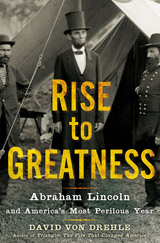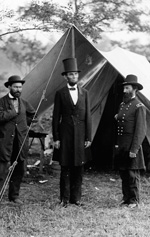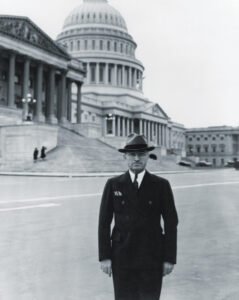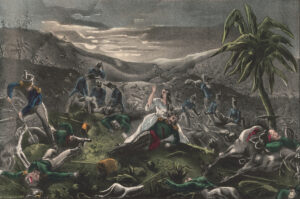 Steven Spielberg’s Lincoln focuses on the last few months of the president’s life, a perfect setting for Hollywood drama. But students of Lincoln as commander in chief should turn to Rise to Greatness: Abraham Lincoln and America’s Most Perilous Year, a new book by David von Drehle. The Time journalist’s narrative follows Lincoln through 1862 and the Civil War’s darkest hours as the Union war machine sputters and George McClellan stews.
Steven Spielberg’s Lincoln focuses on the last few months of the president’s life, a perfect setting for Hollywood drama. But students of Lincoln as commander in chief should turn to Rise to Greatness: Abraham Lincoln and America’s Most Perilous Year, a new book by David von Drehle. The Time journalist’s narrative follows Lincoln through 1862 and the Civil War’s darkest hours as the Union war machine sputters and George McClellan stews.
Can you describe Lincoln’s development as a military thinker and leader over the course of the year?
On New Year’s Eve 1861, the newly formed Joint Congressional Committee on the Conduct of the War met with Lincoln and his Cabinet for several hours. As the committee grilled the president, it gradually dawned on everyone that Lincoln was completely frozen out of military preparations. General in Chief McClellan told him nothing. And worse, McClellan was desperately ill. Lincoln had no grip on the army whatsoever.
From that shocking low point, Lincoln over the year essentially invented the role of commander in chief. There was endless speculation throughout 1862 that he would be deposed by a military dictator. But Lincoln instead marshaled enough political strength that by autumn he’d cashiered or at least neutered his top generals: McClellan, Henry Halleck, and Don Carlos Buell.
All the while he asserted his growing sophistication in both strategy and grand strategy. He even planned and personally commanded the capture of Norfolk in early May of 1862.
Does Lincoln deserve any blame for his falling-out with McClellan?
 Yes, he does—for at least three reasons. First, he naively allowed McClellan to amass so much power in 1861. A 34-year-old former army captain was transformed overnight into supreme strategic and operational commander of the largest armies ever gathered in the Americas. Of course his flaws were exposed under such pressure.
Yes, he does—for at least three reasons. First, he naively allowed McClellan to amass so much power in 1861. A 34-year-old former army captain was transformed overnight into supreme strategic and operational commander of the largest armies ever gathered in the Americas. Of course his flaws were exposed under such pressure.
Second, Lincoln failed to persuade McClellan that European powers would intervene in the war and throw their support to the South if Confederate troops raided Washington. Thus, the general was surprised when Lincoln withheld a full army corps from McClellan’s Peninsula Campaign to protect the capital.
And third, Lincoln’s overconfident attempt to trap and defeat Stonewall Jackson during the Shenandoah Valley campaign again diverted troops from the Peninsula, and scotched whatever chance there might have been to cure McClellan’s belief that the administration was contriving to ruin him.
You loved Bruce Catton’s books as a boy. Why?
I owned Catton’s books long before I could appreciate them. My folks joined the Book-of-the-Month Club and let me choose some of the free books. I was eight, but I knew I wanted books about Lincoln and the Civil War. When I was at last mature enough to appreciate Catton’s mastery, I was blown away by his ability to tell the powerfully human stories of the war, while giving every detail precisely the right amount of emphasis. He understood the war and the warriors on such a deep level. What’s more, he was equally gifted in assaying the political and military history.
What military man had the most influence on Lincoln?
Obviously by the end of the war, a mind-meld had been forged between Lincoln and Grant. But I think the greatest influence on Lincoln in 1862 was Winfield Scott, who’d actually retired as commander of the armies at the end of 1861. His influence is often overlooked; Scott comes to us in most histories as a somewhat clownish figure, corpulent and gouty. But to Americans of Lincoln’s generation, he was Petraeus and Eisenhower and Marshall rolled into one—“the greatest living soldier,” in the words of the Duke of Wellington. Through the first half of 1862, Lincoln never lost sight of the essential elements of Scott’s original Union strategy, namely the naval blockade, the opening of the Mississippi, and the reoccupation of New Orleans. And when those achievements failed to end the war, Lincoln made a grueling trip to West Point in June 1862 to confer with Scott on next steps. This trip—the only one of its kind during Lincoln’s presidency—is testimony to Scott’s influence





